Politics
Afghan earthquake survivors refuse to return to villages, fearing landslides
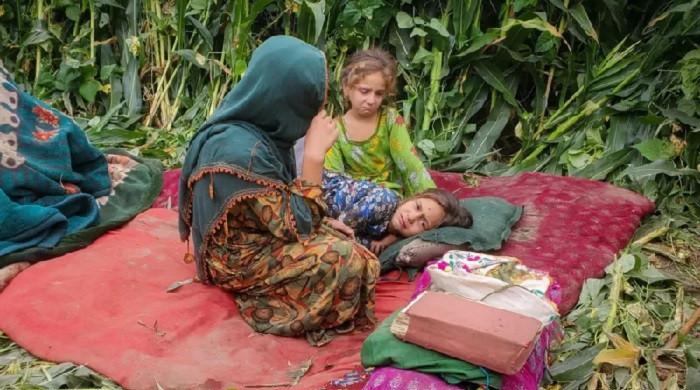
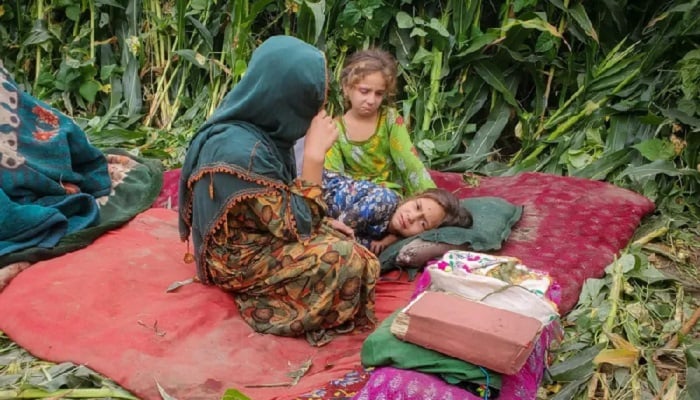
- Survivors camp outdoors fearing aftershocks, lack tents.
- More than 2,200 dead, helicopters delivered aid.
- Children face trauma, disease risks.
Haunted by the fear that aftershocks could bring rocks crashing down from the mountains, the survivors of Afghan earthquakes vowed not to return to destroyed villages but camp in fields and on riverbanks instead, even without tents to keep off the rain.
“We have no shelter, not even a tent,” said 67-year-old farmer Adam Khan, leaning on a stick outside his ruined home in the village of Masud in Afghanistan’s eastern province of Kunar, devastated last week by earthquakes and subsequent aftershocks.
“It rained last night, we had no place to take cover,” he added. “Our biggest fear is the big rocks that could come down at any moment.”
Two earthquakes on September 1 killed more than 2,200 people and injured over 3,600 across the region, flattening thousands of homes, while aftershocks brought fresh landslides, leaving families trapped between unstable mountains and swollen rivers.
Aid groups sped in food and supplies by helicopter, but survivors say help is patchy and slow.
Afghanistan’s poverty and inadequate infrastructure maroon many villages hours from the nearest road, while most homes, built of mud and stone, crumbled instantly in the tremors.
Families cluster in makeshift camps dotting the area. In the village of Shaheedan, farmer Shams-ur-Rahman, 40, said he lost six relatives and fled with his family of nine. Now they sit in the open beside a road, flanked by their few possessions.
“The tents they gave us cannot even accommodate our children,” he said. “On the way down from the mountain, I had no shoes for my son, so I shared mine with him in turns as we walked down.”
For some, the displacement looks set to be permanent. In the harsh glare of the sun, Gul Ahmad, 51, stood beside his relatives, the women of his family crouched in the shade of a wall as their pop-up tents flapped in the dust nearby.
“Even if there is no earthquake, a simple rainfall could bring rocks crashing down on us,” he said. “We will not go back. The government must provide us with a place.”
Without sufficient shelter, sanitation and food, the trauma will spread disease and poverty in one of the world’s poorest and most quake-prone nations, international aid agencies say.
Some of the worst affected are children. Twelve-year-old Sadiq was pulled out alive after being trapped for 11 hours under rubble, in which his grandmother and a cousin were killed beside him.
“I thought I would die,” he said, sitting quietly on a rope bed as cousins and uncles milled around the family’s shelter. “It felt like doomsday.”
Politics
Indonesia nursing home fire kills 16: official


A fire at a nursing home on the Indonesian island of Sulawesi killed more than a dozen people, with three others injured, a local official said Monday.
Firefighters received the report of the blaze at 8:31pm Sunday at a nursing home in the North Sulawesi provincial capital Manado, said the city’s fire and rescue agency chief Jimmy Rotinsulu.
“There were 16 deaths; three (people) had burn injuries,” he told AFP.
Many bodies of the victims were found inside their rooms, Jimmy said, adding that many of the elderly residents were likely resting in their rooms in the evening when the fire broke out.
Authorities managed to evacuate 12 people — all unhurt — and transfer them to a local hospital, he said.
Footage aired by local broadcaster Metro TV showed the fire engulfing the nursing home, while locals helped to evacuate an elderly person.
Deadly fires are not uncommon in Indonesia, a Southeast Asian archipelago of more than 17,000 islands.
A fire tore through a seven-storey office building in Indonesia´s capital Jakarta this month, killing at least 22 people.
In 2023, at least 12 people were killed in the country´s east after an explosion at a nickel-processing plant.
Politics
Deal was closer than ever to end Russia’s invasion of Ukraine: President Trump says
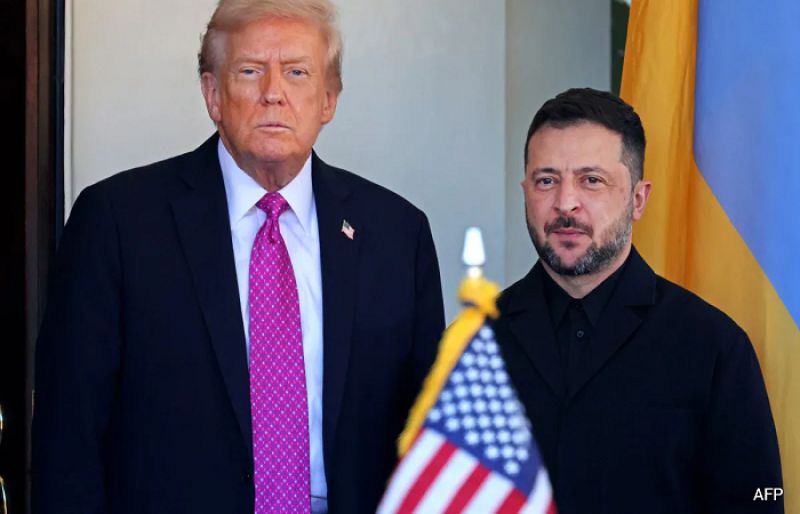

US President Donald Trump said that a deal was closer than ever to end Russia’s invasion of Ukraine but reported no apparent breakthrough on the flashpoint issue of territory after new talks with the warring countries’ leaders.
Trump, who had promised a peace deal on day one of his nearly year-old presidency, said it would become clear within weeks whether it was possible to end the war that has killed tens of thousands of people since February 2022.
In a pre-New Year’s diplomatic sprint, Trump brought Ukrainian President Volodymyr Zelensky to Florida, where the two met with top aides over lunch, a day after Russia unleashed major new attacks on residential areas of the capital Kyiv.
Much like when Zelensky last met Trump in October, Russian President Vladimir Putin also spoke shortly beforehand by telephone with the US leader, who immediately insisted that Moscow was “serious” about peace despite the assault.
“I really believe we’re, Mr President, probably closer than — far closer than — ever before with both parties,” Trump said with Zelensky at his side in the tea room of his Mar-a-Lago estate.
“Everybody wants it ended,” Trump said.
After their talks, Zelensky and Trump spoke jointly by telephone with key European leaders, who have been particularly alarmed about any decisions that would embolden Russia.
Zelensky said that he and European leaders could return jointly for talks with Trump in Washington in January.
The Ukrainian president stayed studiously polite throughout his visit, mindful of his disastrous White House meeting on February 28 where Trump and Vice President JD Vance publicly berated him for not being sufficiently grateful.
Territory impasse
Trump, for all his stated optimism, gave few details on the progress he cited, instead digressing into familiar grievances about his predecessor Joe Biden, who committed billions of dollars for Ukraine’s defense, and speaking of his own friendly rapport with Putin.
Trump acknowledged continued disagreement between Kyiv and Moscow on territory. The current plan, revised after weeks of intense US-Ukrainian negotiations, would stop the war at the current frontlines in the eastern Donbas region and set up a demilitarized area, while Russia has long demanded territorial concessions.
“It’s unresolved, but it’s getting a lot closer. That’s a very tough issue, but one that I think will get resolved,” Trump said.
Trump offered to address the Ukrainian parliament to promote the plan — an idea, however unlikely, that Zelensky was quick to welcome.
Zelensky has voiced an openness to the revised US plan, marking Kyiv’s most explicit acknowledgement yet of possible territorial concessions, although Ukrainians voters would need to approve it in a referendum.
By contrast, Russia has shown no signs of compromise, as it sees hope in the grinding gains it has made over four years against tough Ukrainian defenses.
The Kremlin in its readout of talks between Putin and Trump called on Kyiv to make a “brave decision” and immediately withdraw troops from Donbas, casting European leaders as the impediment to peace.
“Russia and the United States share the same position which is that the Ukrainian and European proposal for a temporary ceasefire (…) would only prolong the conflict and lead to a resumption of hostilities,” the Kremlin’s diplomatic advisor Yuri Ushakov told reporters.
’90 percent’ agreed by Ukraine
Trump’s advisors have previously floated the idea of offering NATO-like security guarantees to Ukraine, meaning in theory that the alliance’s members would respond militarily if Russia attacks again.
Zelensky said that the peace framework laid out by Trump was “90 percent agreed” and that “US-Ukraine security guarantees: 100 percent agreed.”
Zelensky said the two sides were still finalizing a “prosperity plan” for Ukraine as well as the sequencing of the various actions.
Russia had adamantly rejected any entrance of the former Soviet republic into NATO.
In its latest assault with drones and missiles, Russia knocked out power and heating to hundreds of thousands of residents during freezing temperatures.
“If the authorities in Kyiv don’t want to settle this business peacefully, we’ll resolve all the problems before us by military means,” Putin said on Saturday.
Politics
Trump says Ukraine deal closer but no talks breakthrough
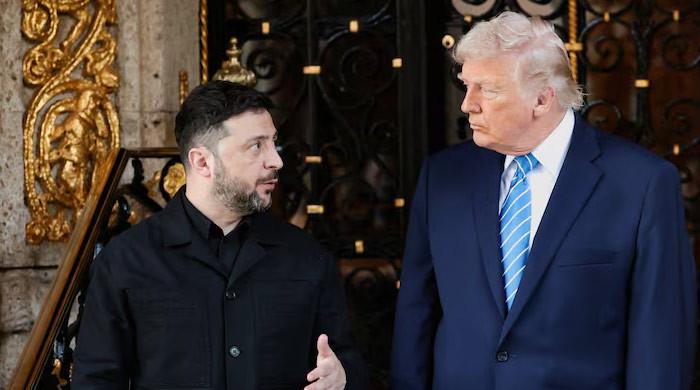
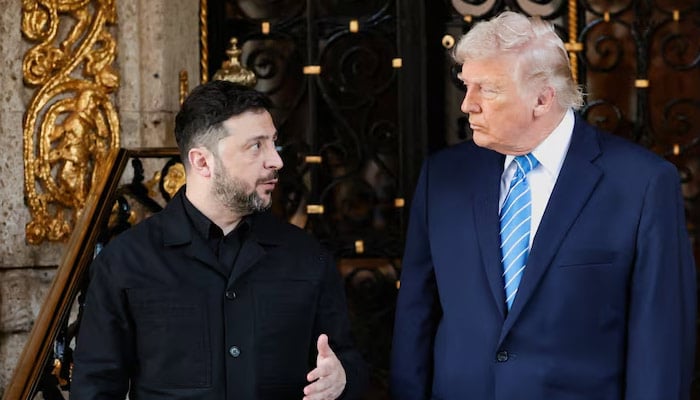
- US and Ukraine “a lot closer” on peace deal: Trump.
- Trump says to be clear within “weeks” if Ukraine war can end.
- Zelenskiy sees agreement on security guarantees for Ukraine.
FLORIDA: US President Donald Trump said Sunday that a deal was closer than ever to end Russia’s invasion of Ukraine, but reported no apparent breakthrough on the flashpoint issue of territory after new talks with the warring countries’ leaders.
Trump, who had promised a peace deal on day one of his nearly year-old presidency, said it would become clear within weeks whether it was possible to end the war that has killed tens of thousands of people since February 2022.
In a pre-New Year’s diplomatic sprint, Trump brought Ukrainian President Volodymyr Zelensky to Florida, where the two met with top aides over lunch, a day after Russia unleashed major new attacks on residential areas of the capital Kyiv.
Much like when Zelensky last met Trump in October, Russian President Vladimir Putin also spoke shortly beforehand by telephone with the US leader, who immediately insisted that Moscow was “serious” about peace despite the assault.
“I really believe we’re, Mr. President, probably closer than — far closer than — ever before with both parties,” Trump said with Zelensky at his side in the tea room of his Mar-a-Lago estate.
“Everybody wants it ended,” Trump said.
After their talks, Zelensky and Trump spoke jointly by telephone with key European leaders, who have been particularly alarmed about any decisions that would embolden Russia.
Zelensky said that he and European leaders could return jointly for talks with Trump in Washington in January.
The Ukrainian president stayed studiously polite throughout his visit, mindful of his disastrous White House meeting on February 28 where Trump and Vice President JD Vance publicly berated him for not being sufficiently grateful.
Territory impasse
Trump, for all his stated optimism, gave few details on the progress he cited, instead digressing into familiar grievances about his predecessor Joe Biden, who committed billions of dollars for Ukraine’s defence, and speaking of his own friendly rapport with Putin.
Trump acknowledged continued disagreement between Kyiv and Moscow on territory. The current plan, revised after weeks of intense US-Ukrainian negotiations, would stop the war at the current frontlines in the eastern Donbas region and set up a demilitarised area, while Russia has long demanded territorial concessions.
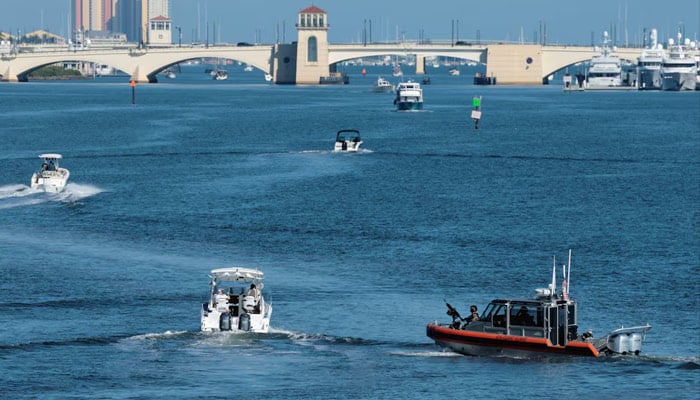
“It’s unresolved, but it’s getting a lot closer. That’s a very tough issue, but one that I think will get resolved,” Trump said.
Trump offered to address the Ukrainian parliament to promote the plan — an idea, however unlikely, that Zelensky was quick to welcome.
Zelensky has voiced an openness to the revised US plan, marking Kyiv’s most explicit acknowledgement yet of possible territorial concessions, although Ukrainian voters would need to approve it in a referendum.
By contrast, Russia has shown no signs of compromise, as it sees hope in the grinding gains it has made over four years against tough Ukrainian defences.
The Kremlin in its readout of talks between Putin and Trump called on Kyiv to make a “brave decision” and immediately withdraw troops from Donbas, casting European leaders as the impediment to peace.
“Russia and the United States share the same position which is that the Ukrainian and European proposal for a temporary ceasefire (…) would only prolong the conflict and lead to a resumption of hostilities,” the Kremlin’s diplomatic advisor, Yuri Ushakov, told reporters.
‘90%’ agreed by Ukraine
Trump’s advisors have previously floated the idea of offering NATO-like security guarantees to Ukraine, meaning in theory that the alliance’s members would respond militarily if Russia attacks again.
Zelensky said that the peace framework laid out by Trump was “90% agreed” and that “US-Ukraine security guarantees: 100% agreed.”
Zelensky said the two sides were still finalising a “prosperity plan” for Ukraine as well as the sequencing of the various actions.
Russia had adamantly rejected any entrance of the former Soviet republic into NATO.
In its latest assault with drones and missiles, Russia knocked out power and heating to hundreds of thousands of residents during freezing temperatures.
“If the authorities in Kyiv don’t want to settle this business peacefully, we’ll resolve all the problems before us by military means,” Putin said on Saturday.
-
Sports1 week ago
Alabama turned Oklahoma’s College Football Playoff dream into a nightmare
-

 Entertainment1 week ago
Entertainment1 week agoRare look inside the secret LEGO Museum reveals the system behind a toy giant’s remarkable longevity
-

 Entertainment1 week ago
Entertainment1 week agoIndia drops Shubman Gill from T20 World Cup squad
-

 Tech1 week ago
Tech1 week agoWe Tried and Tested the Best Gifts for Plant Lovers With Our Own Green Thumbs
-

 Sports2 days ago
Sports2 days agoBrooks Koepka should face penalty if he rejoins PGA Tour, golf pundit says
-

 Sports1 week ago
Sports1 week agoPatriots vs. Ravens (Dec 21, 2025) Live Score – ESPN
-
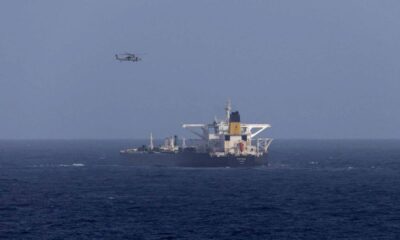
 Politics1 week ago
Politics1 week agoUS intercepts oil tanker off Venezuelan coast, Reports
-
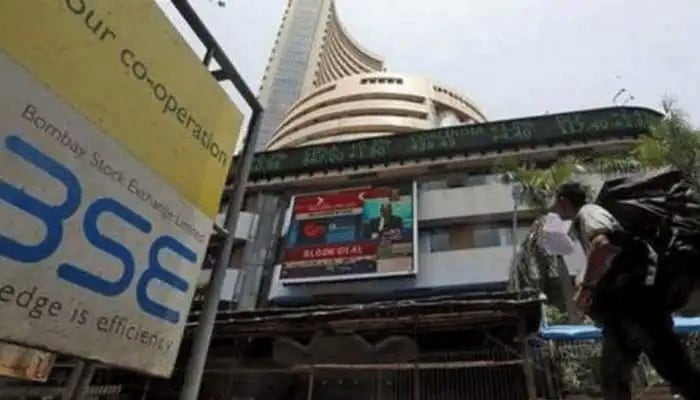
 Business7 days ago
Business7 days agoNeptune Logitek Shares List At 26% Discount, IPO Investors Suffer Nearly Rs 30,000 Losses






